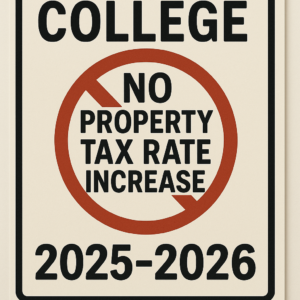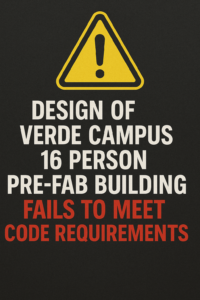 College abandons for now strategy announced at October 2024 meeting that it would increase annual property tax rate by one percentage point
College abandons for now strategy announced at October 2024 meeting that it would increase annual property tax rate by one percentage point
Readers may recall that at its October 2024 District Governing Board meeting, Yavapai Community College (YCC) leadership informed the Board of its plan to adopt an annual strategy of requesting a one percent increase in County property taxes. According to the College, this incremental approach was intended to soften public reaction to periodic tax hikes.
However, within a matter of months, the College appears to have reversed course. At the April 22 Board meeting, Dr. Clint Ewell, Vice President of Finance and Administrative Services, indicated that the College would not seek a property tax rate increase for the 2025–26 budget year.
The reason for this strategic shift remain unclear. Some speculate that the decision may be linked to political considerations, particularly with District 5 Representative Steve Bracety facing re-election in 2026. College-affiliated incumbent Ray Sigafoos lost his seat in 2024, possibly due in part to voter dissatisfaction with his consistent support for tax increases.
Another possible reason is that College leadership recognizes the lack of sufficient support on the Board to pass a property tax rate hike amid the current political climate.
It is noteworthy that at the April meeting Mr. Bracety stated he would not have supported a tax rate increase if one had been proposed, citing recent conversations with business leaders who expressed concern about the economic impact of tariffs on consumers. In that context, he said, a tax rate increase would have been untenable.
 At the March 2025 meeting of the Yavapai Community College District Governing Board, Dr. Clint Ewell, Vice President of Finance and Administrative Services, announced that plans were progressing to construct a prefabricated building to house 16 students as a pilot project on the Verde Valley Campus. Construction was to begin this summer. It was anticipated it would be ready for occupancy by fall 2025.
At the March 2025 meeting of the Yavapai Community College District Governing Board, Dr. Clint Ewell, Vice President of Finance and Administrative Services, announced that plans were progressing to construct a prefabricated building to house 16 students as a pilot project on the Verde Valley Campus. Construction was to begin this summer. It was anticipated it would be ready for occupancy by fall 2025. The annual audit report for Yavapai Community College for fiscal year 2024 was presented to the District Governing Board at its April 2025 meeting. The College received an unmodified, or “clean,” opinion from the independent auditors — the highest level of assurance an institution can achieve.
The annual audit report for Yavapai Community College for fiscal year 2024 was presented to the District Governing Board at its April 2025 meeting. The College received an unmodified, or “clean,” opinion from the independent auditors — the highest level of assurance an institution can achieve. Elizabeth “Liz” Peters, lead faculty for the Yavapai College Electrical & Instrumentation Technology and Applied Pre-Engineering programs, has received the 2025 Faculty Excellence Award for Innovation from the American Association of Community Colleges (AACC). She was one of nine recipients of the annual AACC Awards of Excellence. Peters accepted the award at the AACC Awards of Excellence Gala on April 15 in Nashville, Tennessee.
Elizabeth “Liz” Peters, lead faculty for the Yavapai College Electrical & Instrumentation Technology and Applied Pre-Engineering programs, has received the 2025 Faculty Excellence Award for Innovation from the American Association of Community Colleges (AACC). She was one of nine recipients of the annual AACC Awards of Excellence. Peters accepted the award at the AACC Awards of Excellence Gala on April 15 in Nashville, Tennessee. In an April 17 press release, Yavapai Community College announced that Ryan Avery Follensbee will assume the position of Director of its Viticulture and Enology Program on the Verde Valley Campus. Follensbee replaces Michael Pierce, who resigned in January 2025. Pierce served the college for eleven years and played a key role in developing the Viticulture and Enology program. He served as director of the program for more than six years before his resignation.
In an April 17 press release, Yavapai Community College announced that Ryan Avery Follensbee will assume the position of Director of its Viticulture and Enology Program on the Verde Valley Campus. Follensbee replaces Michael Pierce, who resigned in January 2025. Pierce served the college for eleven years and played a key role in developing the Viticulture and Enology program. He served as director of the program for more than six years before his resignation. The Yavapai Community College District Governing Board will hold a meeting on Tuesday, April 22, via YouTube. The meeting was originally scheduled to take place at the Rock House on the Prescott Campus. However, Board Chair Deb McCasland abruptly changed the format to a virtual Zoom meeting weeks ago, informing the Board, in part, that “after learning of safety concerns related to our board meetings,” they would be held virtually “until further notice.”
The Yavapai Community College District Governing Board will hold a meeting on Tuesday, April 22, via YouTube. The meeting was originally scheduled to take place at the Rock House on the Prescott Campus. However, Board Chair Deb McCasland abruptly changed the format to a virtual Zoom meeting weeks ago, informing the Board, in part, that “after learning of safety concerns related to our board meetings,” they would be held virtually “until further notice.”
 Colleges across the country are increasingly being targeted by fraudsters who use stolen or fake identities to enroll in classes and collect financial aid. For example, at Century College in White Bear Lake, Minnesota, officials estimate that as many as 15% of students in one class were part of what has been described as “an organized crime ring” exploiting this scheme.
Colleges across the country are increasingly being targeted by fraudsters who use stolen or fake identities to enroll in classes and collect financial aid. For example, at Century College in White Bear Lake, Minnesota, officials estimate that as many as 15% of students in one class were part of what has been described as “an organized crime ring” exploiting this scheme. Yavapai Community College announced that effective April 21 Mr. Tim Kneip will become its new Athletic Director. Kneip replaces Michael Tenette, who was hired in September 2023. Tenette replaced Brad Clifford. Clifford who announced his resignation in June 2023 after dedicating over 35 years to the institution. Tenette was hired in September of that year.
Yavapai Community College announced that effective April 21 Mr. Tim Kneip will become its new Athletic Director. Kneip replaces Michael Tenette, who was hired in September 2023. Tenette replaced Brad Clifford. Clifford who announced his resignation in June 2023 after dedicating over 35 years to the institution. Tenette was hired in September of that year.